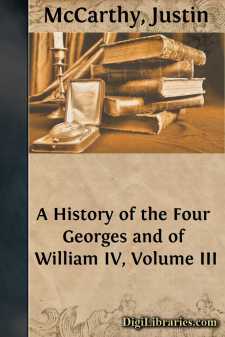Categories
- Antiques & Collectibles 13
- Architecture 36
- Art 48
- Bibles 22
- Biography & Autobiography 813
- Body, Mind & Spirit 142
- Business & Economics 28
- Children's Books 14
- Children's Fiction 11
- Computers 4
- Cooking 94
- Crafts & Hobbies 4
- Drama 346
- Education 46
- Family & Relationships 57
- Fiction 11829
- Games 19
- Gardening 17
- Health & Fitness 34
- History 1377
- House & Home 1
- Humor 147
- Juvenile Fiction 1873
- Juvenile Nonfiction 202
- Language Arts & Disciplines 88
- Law 16
- Literary Collections 686
- Literary Criticism 179
- Mathematics 13
- Medical 41
- Music 40
- Nature 179
- Non-Classifiable 1768
- Performing Arts 7
- Periodicals 1453
- Philosophy 64
- Photography 2
- Poetry 896
- Political Science 203
- Psychology 42
- Reference 154
- Religion 513
- Science 126
- Self-Help 84
- Social Science 81
- Sports & Recreation 34
- Study Aids 3
- Technology & Engineering 59
- Transportation 23
- Travel 463
- True Crime 29
Sort by:
by:
Justin McCarthy
BOLINGBROKE ROUTED AGAIN. While "the King's friends" and the Patriots, otherwise the Court party and the country party, were speech-making and pamphleteering, one of the greatest English pamphleteers, who was also one of the masters of English fiction, passed quietly out of existence. On April 24, 1731, Daniel Defoe died. It does not belong to the business of this history to narrate the...
more...
by:
Justin McCarthy
CHAPTER I. "MORE, ALAS! THAN THE QUEEN'S LIFE!" "The Queen is pretty well," Swift wrote to Lord Peterborough on May 18, 1714, "at present, but the least disorder she has puts all in alarm." Swift goes on to tell his correspondent that "when it is over we act as if she were immortal; neither is it possible to persuade people to make any preparations against an evil...
more...
by:
Justin McCarthy
"OPENS AMID ILL OMENS." The closest student of history would find it hard indeed to turn to the account of any other royal reign which opened under conditions so peculiar and so unpropitious as those which accompanied the succession of George the Fourth to the English throne. Even in the pages of Gibbon one might look in vain for the story of a reign thus singularly darkened in its earliest...
more...
by:
Justin McCarthy
"SUPREME IRONIC PROCESSION." For six and forty years England had been ruled by German princes. One Elector of Hanover named George had been succeeded by another Elector of Hanover named George, and George the First and George the Second, George the father and George the son, resembled each other in being by nature German rather than English, and by inclination Electors of Hanover rather than...
more...
PREFACE. If asked why I took in hand a task of such difficulty and delicacy as that of writing a History of the Church in our Dominion, I can really find no more truthful answer than that of the schoolboy, "Please, Sir, I couldn't help it." From boyhood's days in the old country, when a copy of the Life of Marsden fell into my hands, I felt drawn to the subject; the reading of...
more...
HISTORY. I was born on the 10th of June, 1840, in Thornton, a small town in the northern part of New Hampshire. I was the youngest of six children. Our parents were poor in this world’s goods, but rich in faith and in the knowledge of God as it is in Christ Jesus. My early instructions were limited to a common school, and I was deprived of this at the age of twelve years. Had I improved even these...
more...
Page 15 CHAPTER I THE BEGINNINGS OF NAVIES Civilization and sea power arose from the Mediterranean, and the progress of recent archeological research has shown that civilizations and empires had been reared in the Mediterranean on sea power long before the dawn of history. Since the records of Egypt are far better preserved than those of any other nation of antiquity, and the discovery of the Rosetta...
more...
ASPECTS OF RECENT SCIENCE STUDENTS of the classics will recall that the old Roman historians were accustomed to detail the events of the remote past in what they were pleased to call annals, and to elaborate contemporary events into so-called histories. Actuated perhaps by the same motives, though with no conscious thought of imitation, I have been led to conclude this history of the development of...
more...
I. THE PHLOGISTON THEORY IN CHEMISTRY The development of the science of chemistry from the "science" of alchemy is a striking example of the complete revolution in the attitude of observers in the field of science. As has been pointed out in a preceding chapter, the alchemist, having a preconceived idea of how things should be, made all his experiments to prove his preconceived theory; while...
more...
I. THE SUCCESSORS OF NEWTON IN ASTRONOMYHEVELIUS AND HALLEYSTRANGELY enough, the decade immediately following Newton was one of comparative barrenness in scientific progress, the early years of the eighteenth century not being as productive of great astronomers as the later years of the seventeenth, or, for that matter, as the later years of the eighteenth century itself. Several of the prominent...
more...











